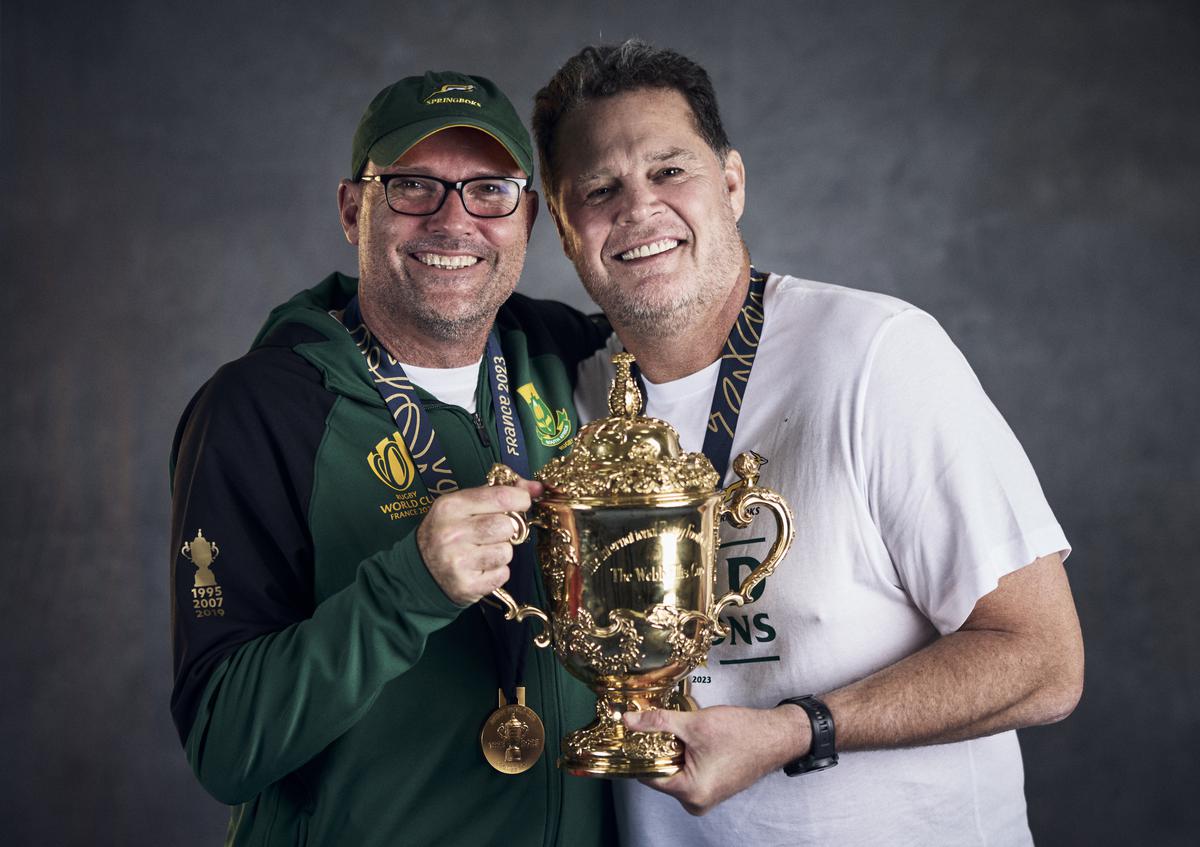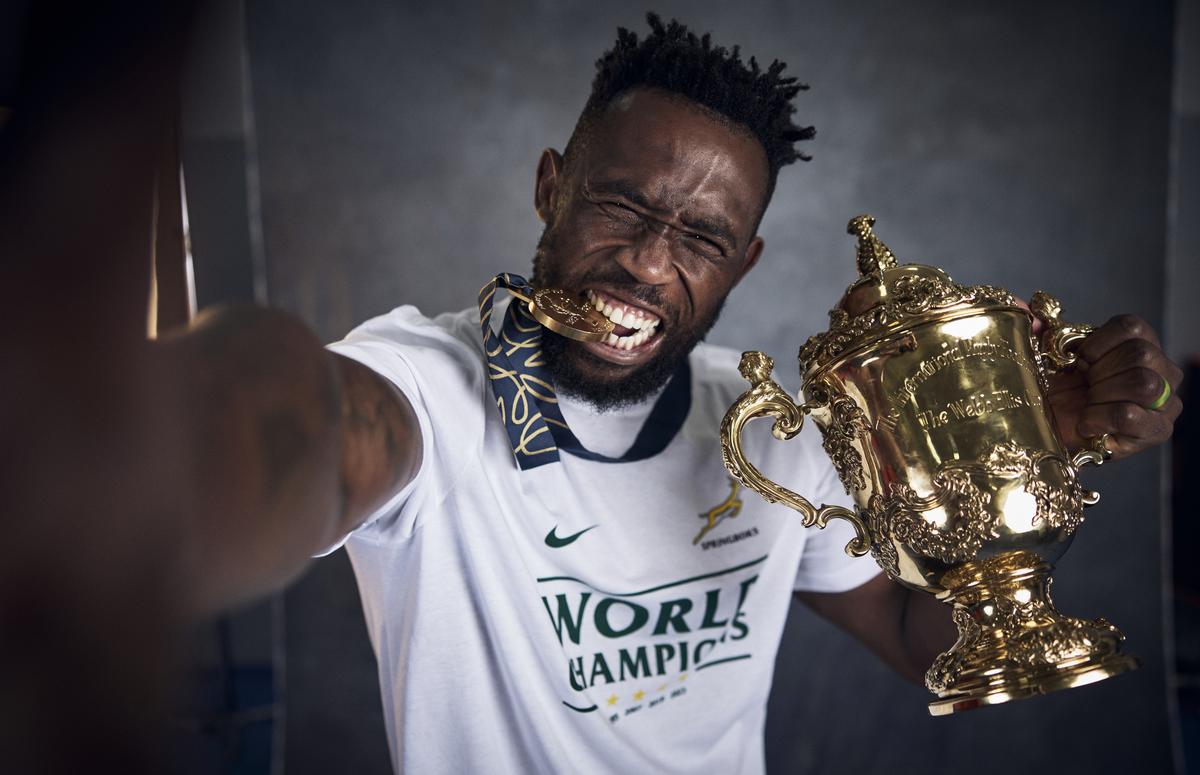How South Africa rose to the top of world rugby

Masterminds: Jacques Nienaber and Rassie Erasmus have worked together — first as assistant coach and head coach, and then as head coach and director of rugby — to turn around a shambolic Springboks side. | Photo credit: Getty Images

History-maker: Siya Kolisi, South Africa’s first black rugby captain, has now lifted the Webb Ellis Cup twice. His leadership of a truly multicultural team has united South Africans in their diversity. | Photo credit: Getty Images
Now that the dust has settled on South Africa’s historic triumph at the Rugby World Cup, it’s a little easier to view the record fourth title in clear light and assess its impact — on rugby as well as on the country. The 12-11 victory over New Zealand in last month’s final was the result of years of planning, left-field thinking, systemic change and a well-developed culture of winning.
South African director of rugby Rassie Erasmus and coach Jacques Nienaber insisted they weren’t “geniuses”, but they clearly got a lot right. Winning back-to-back World Cup titles is incredibly difficult — the mighty All Blacks (2011, 2015) are the only other outfit to have done it.
Not geniuses
“I’m not saying we’re geniuses!” said Nienaber, who took over from Erasmus as head coach after the latter had led South Africa to glory in Japan in 2019. “We don’t try and be creative and think out of the box. It’s not genius, it’s just that the players we have have the ability to give us different tactical viewpoints. Players who understand their roles, don’t have egos and buy into it. That gives us the opportunity to maybe go a little bit different than normal.”
Erasmus and Nienaber appear polar opposites, the latter the straight man in a comedy double act, the former the charismatic scene stealer. But they have worked together — first as head coach and assistant coach, and then as director and head coach — to turn around a shambolic Springboks side. During the course of their partnership, Siya Kolisi, the man Erasmus picked as South Africa’s first black Test captain, has lifted the World Cup trophy twice.
Erasmus, who reached the 1999 World Cup semifinal as a player, divides opinion — he has made ill-judged remarks, ranted against referees and courted controversy, but he has also had a significant impact on the development of the sport in South Africa. His revolutionary shake-up of the system opened the way for under-privileged children under 15 to play the game.
“I wanted to help people avoid embarrassment for what we’ve done — not just apartheid but how we tried to fix things which ended up embarrassing black and white people,” he told the Guardian. The introduction of the Elite Player Development (EPD) in 2013 bore fruit, with a couple of the players forming part of the 2019 World Cup-winning team.
“My greatest moment was not holding the World Cup, it was watching those players create and score tries in the final and trust each other. The EPD was my biggest achievement,” he said.
After the 2019 win, he put into perspective the pressure he and the players had been under.
“Pressure is one of your close relatives being murdered,” he said. “South Africa has a lot of problems and we started talking about how rugby shouldn’t be something that puts pressure on you. It should be something that creates hope.”
Unifying South Africa
Rugby, once associated with white-minority rule in South Africa, has played a symbolic and significant role in unifying the nation. The victory of Kolisi’s team in Paris galvanised people across all races — masking, for a while, deep economic and social woes.
“Never has a team, which was once at the centre of dividing a nation, risen time and again to unite and rally the nation behind one flag, a single identity, and the nation brand,” Khumbudzo Ntshavheni, minister in the presidency, said in a post on X (formerly Twitter). “The Springboks represent something more than themselves; they unite us in our diversity.”
On the previous occasion South Africa took on New Zealand in the final, in 1995, the Springboks had just one black player, Chester Williams, in the side.
Twenty-eight years later, the sport in South Africa is truly multicultural. “We are a diverse and beautiful team from all walks of life… this trophy is for those who come from tough, disadvantaged areas,” Kolisi said. “We come from those backgrounds, this team represents everybody. It’s real for us, we care for each other, we care for our country.”
In addition to transforming the game within South Africa, Erasmus and Nienaber have arguably redefined areas of rugby in their five years together. In 2019, South Africa relentlessly pursued the high contestable kick theory, now used widely by others. The lineout maul was a crucial try-scoring weapon for the Springboks four years ago, as it is now across rugby. But the innovation that has attracted the most attention — and debate — is the ‘bomb squad’.
Erasmus and Nienaber have gambled on the high-risk, high-reward strategy of putting seven forwards and just one backline player on their bench — effectively an entire second pack or a ‘bomb squad’ of marauding big men to be unleashed on tiring rivals. The idea is to keep up intense pressure in the tackles, rucks and mauls while the opposition fatigues.
The idea, interpreted during the 2019 triumph as a 6-2 forwards-backs split, has since been copied by others. But only the Springboks have been brave and stubborn enough to attempt the 7-1 split, which can leave the side horribly exposed if defensive players suffer injuries.
An overtly forward-heavy bench has been criticised by some as reducing rugby to an uninventive physical barrage. When South Africa first used the 7-1 split against New Zealand in a warmup in August, former Scotland coach Matt Williams led the disapproval. But to risk it all in the final — where there is no room for failed experiments — was a gamble requiring nerves of steel. South Africa deserves credit for making such a high-stakes call.
Rebuild for 2027
With Nienaber set to leave for a role at Irish side Leinster, the Boks face a rebuild into the next World Cup in Australia in 2027. They are certain, however, to rely on the bedrock of their gameplan. Erasmus is set to return as head coach, ensuring continuity of the process in the campaign for an unprecedented hat-trick of titles.
South Africa should be also able to count on Kolisi, 32, who has ruled out retirement, saying he still had the hunger to represent the Boks. “Whether I will be captain, I don’t know, that is up to the new coach, but what matters most is playing in the Springbok jersey,” he said.
Nienaber also hinted he could be back in the future. “People think it is the end, but what I have learnt is that we can plan our lives all we want, but you never know [what will happen],” he said. “It is the end for now with this group, but is it my last time with the Boks? I can’t say that.”
For all the latest Sports News Click Here
For the latest news and updates, follow us on Google News.
